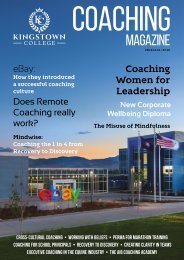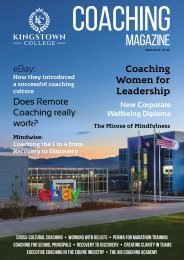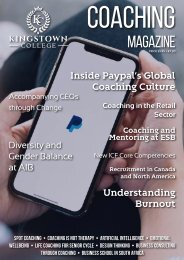Kingstown College Coaching Magazine vol.5 2019/2020
Welcome to another information filled publication of our Coaching Magazine!
Welcome to another information filled publication of our Coaching Magazine!
- No tags were found...
Create successful ePaper yourself
Turn your PDF publications into a flip-book with our unique Google optimized e-Paper software.
www.kingstowncollege.ie
29
how applicable the vertical journey
towards the greater Self could be within
a coaching context, as opposed to a
mentoring or teaching relationship.
Also, I kept recognising both my therapy
and coaching clients presenting with a
need to explore their inner dimension.
For example: L, a 45-year-old, senior
executive for a well-known Irish
company opened with, “After 20 years
working for this company, I feel spent,
emotionally empty. The company in
its quest for profit and following major
corporate reorganisation, has turned us
into mere cogs in a machine. Something
inside me is waking up and knows there
has to be more to life. I want to go to
work feeling inspired; to feel part of a
force for good. I want to come home
and smile at my wife and children
and feel my day has made a valuable
contribution. And most of all, I want to
discover the inherent joy of my being
which I have read about in several
books, but I have no idea how to reach
it”
L is not alone with such feelings, though
for the most, such feelings within the
work environment are not expressed
and instead are held in check, adding to
the stress load and often an inner sense
of fading away.
It was interesting to me, when I read
Sir John Whitmore’s seminal book,
“Coaching for Performance” how
towards the end, he emphasises the
need for evolved leadership and
introduces “transpersonal coaching”
mainly on the basis of “Assagioli’s”
model of psychosynthesis (Assagioli
was a psychiatrist and early pioneer
of humanistic and transpersonal
psychology who developed an approach
which was years ahead of its time).
A few quotes from Whitmore’s book
highlight the need for a transformational
approach to coaching within leadership:
“So we need leaders who are values
driven – that means collective values,
not selfish values ……. “
“So leaders for the future need to have
values and vision and to be authentic
and agile, aligned and on purpose. Add
awareness and responsibility to the
mix, self-belief and a good measure of
emotional intelligence and we have a
powerful recipe.”
“A psychosynthesis trained coach will
invite the coachee to reframe life as
a developmental journey, to see the
creative potential within each problem,
to see obstacles as stepping stones, and
to imagine that we all have a purpose
in life with challenges and obstacles to
overcome in order to fulfil that purpose.”
“transpersonal coaching opens the door
to the superconscious”
“coaches are midwives at the birth
of a new social order, one in which
compassion for all people and caring
for all of nature and our only home form
the core theme.”
When you contemplate Whitmore’s
words it is apparent that the
transpersonal is a natural progression
for coaching and “spiritual” within
this context is about a natural inner
evolution as opposed to adopting
some kind of externally imposed belief
system or religious dogma.
When I asked “L”, the executive
mentioned above, what kind of a leader
he wanted to be and what would make
his work purposeful, he said, “ I want
to show up for work as myself and be
authentic. I want to bring my humanity
to work. I want to make my employees
feel valued and I want to be able to act
not only from my head, but also from my
heart and my spirit. And I want to feel
alive and joyful and help my company
be truly relevant”.
When you hear this, it is obvious that
the executive needed transformational
coaching (I use the word transformational
as opposed to trans-personal because
I feel it embraces more of the journey
from self centered and goal orientated
to being humanity and globally centred,
based on Being, Heartfullness and
Wisdom and the discovery of the Transpersonal
Self. )
Personally, I felt the need to look at
models other that Assagioli’s, not
least because he prescribes lengthy
psycho-analysis as the starting point
and because through my own journey,
I discovered many valuable approaches
and tools which are as good if not more
effective.
One such approach is that of Leon
VanderPol, founder of the Centre for
Transformational Coaching, author of “
A Shift in Being: The Art and Practices
of Deep Transformational Coaching and
probably the world’s leading authority
on transformational coaching.
VanderPol sees coaching approaches as a
polarity between transactional coaching
(goal orientated) and transformational
coaching (aimed at awakening a person
to their true spiritual essence) with
everything in between being what he
calls developmental coaching.
VanderPol begins his book with: (Chapter
1: The Deep Coaching Potential)
“Evocation: Around the world,
across cultures and religions, people
are awakening to the potentials
and realities of higher consciousness.
More and more people are
sensing and desiring a connection
with their deeper essence, and feel
compelled by an inexplicable life
force to understand the greater
nature and meaning of existence.






